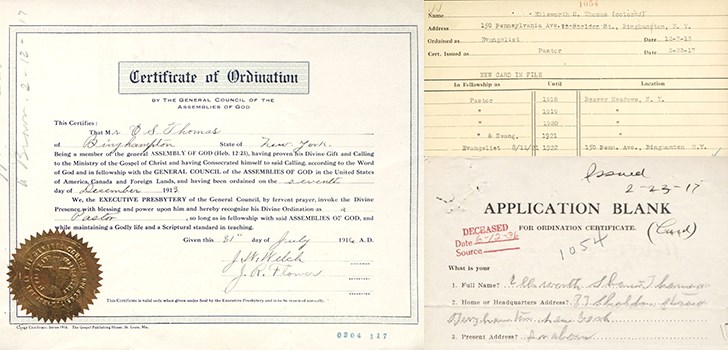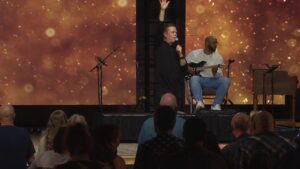The First African American Assemblies of God Minister: Ellsworth S. Thomas
by Darrin J. Rodgers Ellsworth S. Thomas (1866-1936) holds the distinction of being the first African American to hold Assemblies of God (AG) ministerial credentials. His name was just a footnote in the history books until recently, when new information … Continue reading

by Darrin J. Rodgers
Ellsworth S. Thomas (1866-1936) holds the distinction of being the first African American to hold Assemblies of God (AG) ministerial credentials. His name was just a footnote in the history books until recently, when new information came to light.
Ellsworth S. Thomas was born in March 1866 in New York. His parents, Samuel and Mahala, were part of a free black community in Binghamton, New York, that pre-existed the Civil War. They overcame racism and societal restrictions, developed strong families, and carved out their own religious, economic, and social niche in the region.[1]
Samuel was born in Maryland in 1830 and worked as a laborer. He was also a Civil War veteran, serving for three years (1863-1865) as a private in the Massachusetts 54th Infantry. Ellsworth was born about nine months after his father returned home from the war.[2] Mahala was born in 1842 in Pennsylvania and worked as a laundress.[3] According to the 1880 census, Ellsworth was partially blind.[4] He attended common school,[5] which probably consisted of local blacks who joined together and made private arrangements to hire a teacher.[6] After Samuel passed away in the early 1890s, Ellsworth lived with his mother and cared for her. She died on April 24, 1913.[7] Census records show that Ellsworth owned a modest house (valued at $2,000 in 1930) and that most of his neighbors were white.[8] He never married.[9]
Binghamton city directories from 1888-1892 reveal that Ellsworth was a laundryman and a laborer. Beginning in 1899, though, they listed his occupation as a traveling evangelist.[10] His name first appeared in the AG ministers’ directory in October 1915, which stated that he was a “colored” pastor in Binghamton.[11]
In 1917, AG leaders asked existing ministers to re-submit applications for credentials, apparently because paperwork had not been kept during the earliest years of the Fellowship. Robert Brown, influential pastor of Glad Tidings Tabernacle in New York City, endorsed Ellsworth’s 1917 application. On the application, Ellsworth stated that he was originally ordained on December 7, 1913, by Robert E. Erdman, a Pentecostal pastor from Buffalo, New York.[12]
Records at the Flower Pentecostal Heritage Center show that Thomas pastored a congregation in Beaver Meadows, New York, from about 1917 until about 1922. He remained an AG evangelist for the remainder of his life. He held evangelistic meetings in the area around Binghamton, he held regular services in his home, and he pastored again briefly in about 1926.[13] He also was a regular speaker in the 1930s at two other black churches in Binghamton—Shiloh Baptist Church and Bethel African Methodist Episcopal Church.[14]
A 1936 letter from Paul Westendorf informed the Pentecostal Evangel of Ellsworth’s death on June 12, 1936. He was 70 years old and passed away in Binghamton after a serious illness. Westendorf wrote,
He has been in the Council Fellowship for many years and so will be remembered throughout the Eastern District. Brother Thomas was faithful and true to the Lord in all kinds of circumstances, serving Him with gladness, therefore we feel that he had an abundant entrance in the presence of the Lord.[15]
Thomas’s funeral was held in Christ Episcopal Church in Binghamton, the oldest Episcopal congregation in the city, with the church’s pastor, Theodore J. Dewees, officiating. Thomas was buried in the Christ Episcopal Church plot in Spring Forest Cemetery.[16]
The newsletter of the Eastern District (which included Pennsylvania, Delaware, New York, and New Jersey) noted Thomas’s passing:
Brother Ellsworth S. Thomas has been taken home to glory, but very little has been learned about the details. His funeral was conducted by the rector of Christ Church, Episcopal, in Binghamton…Many will remember Brother Ellsworth as a Bible teacher and some of the ministers will remember the fellowship we had with Brother Thomas one morning before meetings opened up, at the council in Rochester years ago, when we all sang “He’s Coming in Power” and Brother Thomas got to dancing in the Spirit, while he held onto a near-by [sic] door because of his almost being blind. He is one more of our number who is on the other side![17]
Ellsworth S. Thomas’s passing was also briefly noted on page 13 of the July 25, 1936, issue of the Pentecostal Evangel.[18] A photograph of Thomas has not been located.
When Ellsworth S. Thomas transferred his ordination to the AG in 1915, the Fellowship was only a year old. He probably did not know that he was the AG’s first credentialed black minister. Thomas became known throughout the Eastern District for his Bible teaching and for his good cheer despite the obstacles he faced, including partial blindness. He never pastored a large congregation, but he was faithful where God placed him. Over the years, memories of this pioneer dimmed. However, Ellsworth S. Thomas remains an example, not just for black ministers, but for all who desire to follow Christ wholeheartedly.
Adapted from: Darrin J. Rodgers, “The Untold Stories of Three Black Assemblies of God Pioneers,” Assemblies of God Heritage 39/40 (2019-2020): 37-41.
[1] Keisha N. Benjamin, “Free Blacks in Nineteenth Century Binghamton,” Binghamton Journal of History 6 (2006).
[2] U.S., Civil War Soldier Records and Profiles, 1861-1865. Ancestry.com
[3] 1870 U.S. Federal Census. Binghamton Ward 2, Broome Co., New York, 27.
[4] 1880 U.S. Federal Census. District 38, Binghamton, Broome Co., New York, 22B.
[5] Ellsworth S. Thomas, ministerial file, FPHC.
[6] Benjamin, “Free Blacks in Nineteenth Century Binghamton.”
[7] New York Death Index. Ancestry.com.
[8] 1900 U.S. Federal Census. District 0013, Binghamton Ward 05, Broome Co., New York, 12A-B; 1930 U.S. Federal Census. District 0023, Binghamton Ward 05, Broome Co., New York, 10A.
[9] Ellsworth S. Thomas, ministerial file, FPHC.
[10] Binghamton City Directories, Ancestry.com.
[11] Assemblies of God ministerial directory, 1915, 16.
[12] Ellsworth S. Thomas, ministerial file, FPHC.
[13] Ellsworth S. Thomas, ministerial file, FPHC.
[14] Press and Sun Bulletin (Binghamton, NY), June 17, 1933, 16; Press and Sun Bulletin (Binghamton, NY), September 16, 1933, 9; Press and Sun Bulletin (Binghamton, NY), December 23, 1933, 9.
[15] Ibid.
[16] Eastern District Bulletin, October 1936, 21; Obituary, “Ellsworth H. [sic] Thomas,” Press and Sun Bulletin (Binghamton, NY), June 15, 1936, 5.
[17] Eastern District Bulletin, October 1936, 21.
[18] Pentecostal Evangel, July 25, 1936, 13.
Do you have Pentecostal historical materials that should be preserved? Please consider depositing these materials at the Flower Pentecostal Heritage Center (FPHC). The FPHC, located in the Assemblies of God national offices, is the largest Pentecostal archive in the world. We would like to preserve and make your treasures accessible to those who write the history books.
Flower Pentecostal Heritage Center
1445 North Boonville Avenue
Springfield, Missouri 65802 USA
Phone: 417.862.1447 ext. 4400
Toll Free: 877.840.5200
Email: archives@ag.org
Website: www.iFPHC.org



